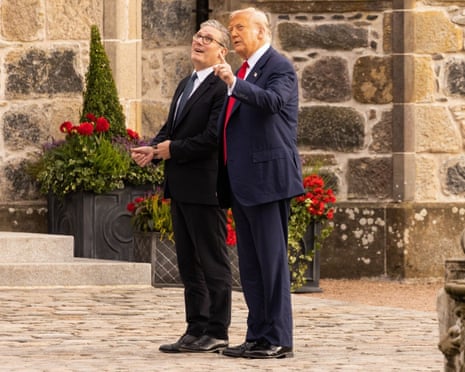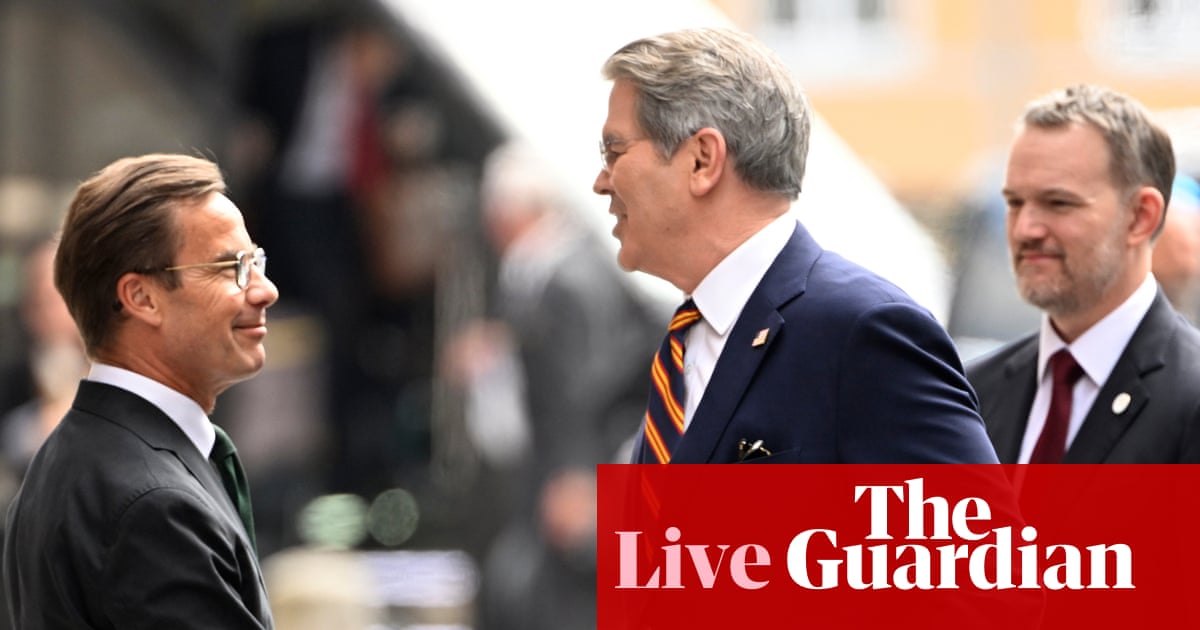US-China talks extension ‘likely’ as Trump targets ‘world tariff’
Good morning, and welcome to our live coverage of business, economics and financial markets.
After the US and EU announced the outline of a trade deal that would limit tariffs to 15%, it looks like talks with China could be the next on the agenda, with an extension of a truce in the trade war “likely”, according to a top official in the Trump administration.
US Treasury chief Scott Bessent arrived yesterday in Sweden, alongside China’s vice premier He Lifeng, according to Reuters. Back in the US, Howard Lutnick, the commerce secretary told Fox News that a delay to a higher tariff deadline was probable:
Is that a likely outcome? Sure, it seems that way, but let’s leave it to President Trump to decide.
Donald Trump triggered financial market chaos after slapping tariffs at 145% on China. However, in May he announced a 90-day pause, lowering tariffs to (a still significant) 30%. That left a deadline of 12 August for the talks, but it is
US trade representative Jamieson Greer told the CNBC news channel he did not expect “some kind of enormous breakthrough today” at the talks in Stockholm, although he flagged that a deal last month to speed up rare earth metal imports from China to the US would be on the agenda. He said:
What I expect is continued monitoring and checking in on the implementation of our agreement thus far, making sure that key critical minerals are flowing between the parties and setting the groundwork for enhanced trade and balanced trade going forward.
It came after the US and EU announced a deal to limit tariffs to 15%. The end of market uncertainty appeared to be welcomed at first by markets on Monday – only for the mood to sour somewhat later in the day. The French prime minister, François Bayrou, said the EU had capitulated to Donald Trump, and said it was a “dark day” for the EU.
Trump on Monday suggested that he could impose a “world tariff” on all of the countries that have not agreed a trade deal. That tariff could be 15% or 20% – meaning that, after all the negotiating effort, the EU could be left with similar terms to the rest of the world.
 US President Donald Trump and British Prime Minister Keir Starmer (left) listen to a bagpipe band as they arrive at the Trump International Golf Links course in Aberdeen, Scotland on 28 July 2025. Photograph: Chris Ratcliffe/EPA
US President Donald Trump and British Prime Minister Keir Starmer (left) listen to a bagpipe band as they arrive at the Trump International Golf Links course in Aberdeen, Scotland on 28 July 2025. Photograph: Chris Ratcliffe/EPA
At his golf course in Scotland yesterday, while visiting UK Prime Minister Keir Starmer, Trump said:
I would say it’ll be somewhere in the 15 to 20% range. Probably one of those two numbers.
On the prospects of Chinese talks, Trump said:
I’d love to see China open up their country.
Back in May, Trump had said that China had already “agreed to open up” – but it appears there may be more work to be done.
The agenda
-
9:30am BST: Bank of England mortgage approvals (June; previous: 63,032; consensus: 63,000)
-
9:30am BST: Bank of England consumer credit (June; previous: £859m; consensus: £1.2bn)
Updated at 03.00 EDT
Key events
Show key events only
Please turn on JavaScript to use this feature
 Lisa O’Carroll
Lisa O’Carroll
Pharmaceutical exports from the EU to the US could be hit by 15% tariffs as soon as Friday, according to the White House.
It published a fact sheet summarising the deal with the EU that stated pharma will be taxed at the base rate agreed in deal sealed at Donald Trump’s golf course in Scotland on Sunday.
But it has caused yet more confusion because it comes less than 24 hours after EU officials were told that pharma would remain duty-free until Trump’s “section 232” national security investigations into pharma and semiconductors concluded.
As part of President Trump’s strategy to establish balanced trade, EU exports to the US will be liable for a tariff rate of 15%, including on autos and auto parts, pharmaceuticals, and semiconductors.
However, Trump had also said earlier this month he was going to phase in tariffs for pharma this week.
The text also says that the EU has agreed not to introduce a tech tax. It said:
The United States and the European Union intend to address unjustified digital trade barriers. In that respect, the European Union confirms that it will not adopt or maintain network usage fees. Furthermore, the United States and the European Union will maintain zero customs duties on electronic transmissions.
ShareAstraZeneca chief executive Pascal Soriot reacts during a signing event in Washington for documents related to a manufacturing site investment in Virginia. Photograph: Ümit Bektaş/Reuters
Drug company AstraZeneca’s profits jumped by 30% year-on-year in the second quarter of 2025 to $3.1bn (£2.3bn), as sales surged in the US.
The largest UK-listed company reported an 11% increase in sales to $13.8bn, beating forecasts.
AstraZeneca’s share price rose 1.9% on Tuesday morning, behind only Games Workshop on the FTSE 100.
The strong sales come with the pharmaceutical industry bracing for more tariffs from Donald Trump’s US administration if, as expected, it finds that reliance on drug imports are a threat to national security.
AstraZeneca has already pledged to increase spending in the US, including last week’s announcement of a $50bn investment in the US to expand manufacturing in the state of Virginia.
Pascal Soriot, AstraZeneca’s chief executive, said:
Our strong momentum in revenue growth continued through the first half of the year and the delivery from our broad and diverse pipeline has been excellent.
As we enter our next phase of growth, we have pledged $50bn to continue to grow in the US, which includes the largest manufacturing investment in AstraZeneca’s history, set for Virginia. This landmark investment reflects not only America’s importance but also our confidence in our innovative medicines to transform global health and power AstraZeneca’s ambition to deliver $80bn revenue by 2030.
ShareThe UK has not reached ‘peak Greggs’ – chief executiveRoisin Currie, Greggs’s chief executive, said the UK had not reached “peak Greggs”. Photograph: Greggs
Greggs’s chief executive has said the UK has not reached “peak Greggs”, after the bakery chain reported a dip in profits that it blamed on lower demand – and the hot weather.
The company, famed for its sausage rolls (and various other foodstuffs wrapped in pastry), said the first half of the year was “impacted by challenging market footfall, more weather disruption than in 2024, and phasing of cost headwinds”.
Roisin Currie told reporters that trading in July “has still been quite soft” – but hit back at the suggestion that the chain’s expansion had reached its peak, Reuters reported.
The company – a member of the FTSE 100 – said it had opened 87 new shops in the first half of 2025 with 56 closures, and it said it had “continued expansion of footprint beyond traditional high street locations”.
The bakery’s pre-tax profits dropped from £74m in the first half of last year to £64m this year, despite an increase in total sales to over £1bn.
Updated at 03.40 EDT
Trading is open on European stock markets, and it is looking fairly quiet in the first trades.
The FTSE 100 has gained 0.1%. The top risers are gambling company Entain – up 2.1% after it was boosted by rival BetMGM raising its full-year guidance – and Warhammer figurine maker Games Workshop, up 1.5% after saying profits jumped 30%.
The Euro Stoxx index of Europe’s biggest companies rose 0.2% in the early trades, while France’s Cac 40 was up 0.1% and Germany’s Dax rose 0.4%.
ShareUS-China talks extension ‘likely’ as Trump targets ‘world tariff’
Good morning, and welcome to our live coverage of business, economics and financial markets.
After the US and EU announced the outline of a trade deal that would limit tariffs to 15%, it looks like talks with China could be the next on the agenda, with an extension of a truce in the trade war “likely”, according to a top official in the Trump administration.
US Treasury chief Scott Bessent arrived yesterday in Sweden, alongside China’s vice premier He Lifeng, according to Reuters. Back in the US, Howard Lutnick, the commerce secretary told Fox News that a delay to a higher tariff deadline was probable:
Is that a likely outcome? Sure, it seems that way, but let’s leave it to President Trump to decide.
Donald Trump triggered financial market chaos after slapping tariffs at 145% on China. However, in May he announced a 90-day pause, lowering tariffs to (a still significant) 30%. That left a deadline of 12 August for the talks, but it is
US trade representative Jamieson Greer told the CNBC news channel he did not expect “some kind of enormous breakthrough today” at the talks in Stockholm, although he flagged that a deal last month to speed up rare earth metal imports from China to the US would be on the agenda. He said:
What I expect is continued monitoring and checking in on the implementation of our agreement thus far, making sure that key critical minerals are flowing between the parties and setting the groundwork for enhanced trade and balanced trade going forward.
It came after the US and EU announced a deal to limit tariffs to 15%. The end of market uncertainty appeared to be welcomed at first by markets on Monday – only for the mood to sour somewhat later in the day. The French prime minister, François Bayrou, said the EU had capitulated to Donald Trump, and said it was a “dark day” for the EU.
Trump on Monday suggested that he could impose a “world tariff” on all of the countries that have not agreed a trade deal. That tariff could be 15% or 20% – meaning that, after all the negotiating effort, the EU could be left with similar terms to the rest of the world.
US President Donald Trump and British Prime Minister Keir Starmer (left) listen to a bagpipe band as they arrive at the Trump International Golf Links course in Aberdeen, Scotland on 28 July 2025. Photograph: Chris Ratcliffe/EPA
At his golf course in Scotland yesterday, while visiting UK Prime Minister Keir Starmer, Trump said:
I would say it’ll be somewhere in the 15 to 20% range. Probably one of those two numbers.
On the prospects of Chinese talks, Trump said:
I’d love to see China open up their country.
Back in May, Trump had said that China had already “agreed to open up” – but it appears there may be more work to be done.
The agenda
-
9:30am BST: Bank of England mortgage approvals (June; previous: 63,032; consensus: 63,000)
-
9:30am BST: Bank of England consumer credit (June; previous: £859m; consensus: £1.2bn)
Updated at 03.00 EDT
